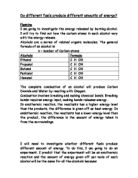Energy = mass of water used x specific heat capacity x temperature rise
(j) (kg) J/kg ˚C (˚c)
As the mass of water used is known.
That means no matter how much alcohol we burned to increase the temperature of the water, the energy given off will stays the same according to the formula.
Apparatus
- Spirit burners (containing ethanol, propanol, butanol, pentanol, hexanol)
- Heat proof mats
- Clamps and stands
- Tin water container
- Electronic balance ( 2 decimal places)
- Thermometer
- Measuring cylinder
Safety control
- I have to wear goggles, prevent any accidents that can damage my eyes
- I have to make sure all the school bags are under the table, in case it trips me over
- I have to make sure I handle all the glassware carefully
Diagram
Method
- Set up the experiment as the diagram shows
- Weigh and record the spirit burner’s weight
- Put the spirit burner back to position and light it
- When the temperature of the water has increased by 35 ˚c, put the fire off
- Weigh and record the spirit burner’s weight
- Repeat the experiment three times with each alcohol
- Plot graph (energy against number of carbon atoms, number of moles burned against carbon atoms)
- Draw best-fit line
Results
No. of moles of burned = mass burned (g) / molar mass
Energy = mass of water used x specific heat capacity x temperature rise
(j) (kg) J/kg ˚C (˚c)
147j = 1 x 4.2 x 35
Analysis
From the first graph (energy against number of carbon atoms), it shows a straight horizontal best-fit line which means all the alcohol gives out the same amount of energy. This is because:
Energy = mass of water used x specific heat capacity x temperature rise
(j) (g) (˚c)
The molar mass of the alcohol or the number of carbon atoms does not exist in the formula which means the energy is not affected by the kind of fuel being used.
The second graph (number of moles burned against carbon atoms) shows a curve best-fit line which means as the number of carbon atoms increases, the number of moles burned decreases. I think this is because the alcohols with more carbon atoms such as hexanol, has to burnt more alcohol to produce the same amount of energy as the alcohol with less carbon atoms. The reason why more fuel has been burnt is because of the large number of carbon atoms and large molecular length. The larger surface area allows more energy to be released, so less fuel is needed to burn to give certain energy.
Evaluation
I think the results are very good that I can use them to support what I predicted at the beginning. I also have enough evidence to support my conclusion. I know my results are reliable because they fitted my prediction and it also enables me to explain the relation between alcohols and the energy it produced. I think my experiment is quite successful as I can collect results that help me to draw an accurate graph except there is one anomalous point as it far away from the best-fit line. I think this happened because:
- Heat conducted and convected away through air which will increase the reading
- Radiation of heat out into the atmosphere which will increase the reading
- Evaporation of water so less water is available to heat which will decrease the energy produced
I think the experiment can improve by improving insulation techniques to obtain more accurate readings. Also, I can use a copper water container as copper is a better heat conductor than steel. I can also use a wider range of alcohols such as methanol and heptanol to get a wider range of results to support a firm conclusion and give a better graph reading.
I can do the experiment in this way:
Further experiment
Planning
Apparatus
- Spirit burners (containing methanol, ethanol, propanol, butanol, pentanol, hexanol, heptanol)
- Heat proof mats
- Clamps and stands
- Copper water container
- Electronic balance ( 2 decimal places)
- Thermometer
- Measuring cylinder
Safety control
- I have to wear goggles, prevent any accidents that can damage my eyes
- I have to make sure all the school bags are under the table, in case it trips me over
- I have to make sure I handle all the glassware carefully
Method
- Set up the experiment as the diagram shows
- Weigh and record the spirit burner’s weight
- Put the spirit burner back to position and light it
- When the temperature of the water has increased by 35 ˚c, put the fire off
- Weigh and record the spirit burner’s weight
- Repeat the experiment three times with each alcohol
- Plot graph (energy against number of carbon atoms, number of moles burned against carbon atoms)
- Draw best-fit line







